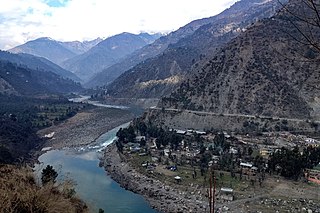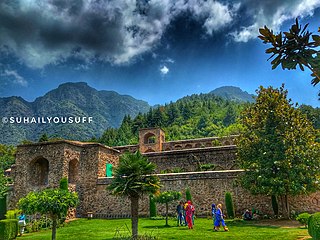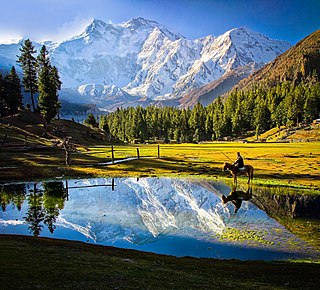
The Indo-Pakistani War of 1947–1948, or the First Kashmir War, was a war fought between India and Pakistan over the princely state of Jammu and Kashmir from 1947 to 1948. It was the first of four Indo-Pakistani wars between the two newly independent nations. Pakistan precipitated the war a few weeks after its independence by launching tribal lashkar (militias) from Waziristan, in an effort to capture Kashmir and to preempt the possibility of its ruler joining India. The inconclusive result of the war still affects the geopolitics of both countries.

The Jammu & Kashmir National Conference (JKNC) is a regional political party in the Indian union territories of Jammu and Kashmir and Ladakh. Founded as the All Jammu and Kashmir Muslim Conference by Sheikh Abdullah and Chaudhry Ghulam Abbas in 1932 in the princely state of Jammu and Kashmir, the organisation renamed itself to "National Conference" in 1939 in order to represent all the people of the state. It supported the accession of the princely state to India in 1947. Prior to that, in 1941, a group led by Ghulam Abbas broke off from the National Conference and revived the old Muslim Conference. The revived Muslim Conference supported the accession of the princely state to Pakistan and led the movement for Azad Kashmir.

The Chenab River is a major river that flows in India and Pakistan, and is one of the 5 major rivers of the Punjab region. It is formed by the union of two headwaters, Chandra and Bhaga, which rise in the upper Himalayas in the Lahaul region of Himachal Pradesh, India. The Chenab flows through the Jammu region of Jammu and Kashmir, India into the plains of Punjab, Pakistan, before ultimately flowing into the Indus River.

Pahalgam, known as Pahalgom is a town and a notified area committee, near Anantnag city in the Anantnag district of the Indian-administered union territory of Jammu and Kashmir. It is a popular tourist destination and hill station. Its lush green meadows and pristine waters attract thousands of tourists from all over the world each year. It is located 45 kilometres (28 mi) from Anantnag on the banks of Lidder River at an altitude of 7,200 feet (2,200 m). Pahalgam is the headquarters of one of the eleven tehsils of Anantnag district.

Poonch, is a town and the administrative headquarters of the Poonch district, in the Jammu division of the Indian-administered union territory of Jammu and Kashmir, which is part of the larger disputed territory of Kashmir. It is located near the Line of Control – the de facto border in the disputed region. Poonch shares a de facto border with the Poonch district of the Pakistan-administered, self-governing territory of Azad Kashmir.
Girish Chandra 'Gary' Saxena was a governor of Jammu and Kashmir state in India. Born in Agra in 1928, he joined the Indian Police Service (IPS) and held many positions in police and retired as Director of the Research and Analysis Wing, India's external intelligence agency. He took over as the head of the State on 2 May 1998 for the second time. Earlier, he held the office of the Governor J&K from 26 May 1990 to 13 March 1993.

General elections were held in India on 20 May, 12 June and 15 June 1991 to elect the members of the 10th Lok Sabha, although they were delayed until 19 February 1992 in Punjab.

Narinder Nath Vohra, popularly referred as N. N. Vohra, is a retired 1959 batch Indian Administrative Service (IAS) officer of Punjab cadre who was the 12th governor of the Indian state of Jammu and Kashmir. He was the first civilian governor of Jammu and Kashmir in eighteen years after Jagmohan.

Raja Sakhi Daler Khan was born in the village of Sarsawa, Kotli in the year 1928. He led Pakistani troops and irregulars in the Indo-Pakistani War of 1947. Due to his major role in the liberation of the Poonch valley regions of Azad Jammu and Kashmir, the village of Sarsawa was subsequently renamed Sakhi Delair Abad in his honour.

Pari Mahal or Peer Mahal, also known as The Palace of Fairies, is a seven-terraced Mughal garden located at the top of Zabarwan mountain range, overlooking the city of Srinagar and the south-west of Dal Lake in the Indian union territory of Jammu and Kashmir. It is an example of Islamic architecture and patronage of art during the reign of the then Mughal Emperor Shah Jahan.

Jitendra Singh is an Indian physician and politician. He is the Minister of State for the Ministry of Science and Technology and Minister of State for Prime Minister's Office; Personnel, Public Grievances and Pensions; Department of Atomic Energy and Department of Space.

S. P. Varma is a social worker and peace activist from Jammu and Kashmir. He has been actively involved in peace-building efforts in conflict-ridden areas of the Kashmir valley.

The Jammu–Sialkot line was a 43 km (27 mi) broad gauge branch of the North Western State Railway from Wazirabad Junction, Punjab, to Jammu, passing through the Sialkot Junction. The section from Sialkot to Jammu (Tawi) was 27 miles (43 km) long, partly in the British Indian province of Punjab and partly in the princely state of Jammu and Kashmir Built in 1890 during the reign of Maharaja Pratap Singh, it was the first railway line in the state of Jammu and Kashmir.

Jammu is a city in Indian-administered Jammu and Kashmir in the disputed Kashmir region. It is the winter capital of Jammu and Kashmir, which is an Indian-administered union territory. It is the headquarters and the largest city in Jammu district. Lying on the banks of the river Tawi, the city of Jammu, with an area of 240 km2 (93 sq mi), is surrounded by the Himalayas in the north and the northern plains in the south. Jammu is the second-most populous city of the union territory. Jammu is known as "City of Temples" for its ancient temples and Hindu shrines.

The Western Himalayas refers to the western half of the Himalayas, in northwestern India and northern Pakistan. Four of the five tributaries of the Indus River in Punjab rise in the Western Himalayas; while the fifth, the Sutlej cuts through the range after rising in Tibet.

Girish Chandra Murmu is the 14th Comptroller and Auditor General of India and the external auditor of the Inter-Parliamentary Union. He is also the chairman of the United Nations Panel of External Auditors and the Asian Organization of Supreme Audit Institutions. He is currently the external auditor of the WHO (2020-2023), succeeding the Auditor General of the Philippines. He was the Inaugural Lieutenant Governor of the Union Territory of Jammu and Kashmir till 6 August 2020. He is a retired 1985 batch IAS officer of Gujarat cadre and was principal secretary to Narendra Modi during his tenure as the Chief Minister of Gujarat.
The Jammu Praja Parishad was a political party active in the Jammu Division of the Indian-administered Jammu and Kashmir. It was founded in November 1947 by the Rashtriya Swayamsevak Sangh activist Balraj Madhok, and served as the main opposition party in the state. It maintained close ties with Bharatiya Jana Sangh during its lifetime and merged with the latter in 1963. Its main activity was to campaign for the close integration of Jammu and Kashmir with India and oppose the special status granted to the state under the Article 370 of the Indian constitution. After its merger with the Bharatiya Jana Sangh, the precursor of the present day Bharatiya Janata Party, the party gradually rose in stature. As an integral part of the Bharatiya Janata Party, it was a partner in the ruling coalition led by the People's Democratic Party.

Jammu and Kashmir is a region administered by India as a union territory and consists of the southern portion of the larger Kashmir region, which has been the subject of a dispute between India and Pakistan since 1947 and between India and China since 1959. The Line of Control separates Jammu and Kashmir from the Pakistani-administered territories of Azad Kashmir and Gilgit-Baltistan in the west and north. It lies to the north of the Indian states of Himachal Pradesh and Punjab and to the west of Ladakh which is administered by India as a union territory.














